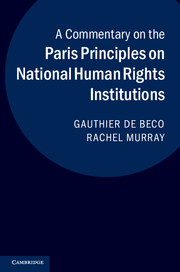Book contents
- Frontmatter
- Contents
- Foreword
- List of abbreviations
- Part I Background: history and challenges
- Part II Commentary principle by principle
- 3 Competence
- 4 Mandate
- 5 Pluralism and representativeness
- 6 Independence
- 7 Working methods and strategy
- 8 Quasi-judicial powers
- 9 Stakeholders
- Part III Twenty years later: the future of the Paris Principles
- Annex I Principles relating to the status of national institutions (The Paris Principles)
- Annex II ICC General observations as at May 20131
- Bibliography
- Index
- References
8 - Quasi-judicial powers
from Part II - Commentary principle by principle
Published online by Cambridge University Press: 05 November 2014
- Frontmatter
- Contents
- Foreword
- List of abbreviations
- Part I Background: history and challenges
- Part II Commentary principle by principle
- 3 Competence
- 4 Mandate
- 5 Pluralism and representativeness
- 6 Independence
- 7 Working methods and strategy
- 8 Quasi-judicial powers
- 9 Stakeholders
- Part III Twenty years later: the future of the Paris Principles
- Annex I Principles relating to the status of national institutions (The Paris Principles)
- Annex II ICC General observations as at May 20131
- Bibliography
- Index
- References
Summary
ADDITIONAL PRINCIPLES CONCERNING THE STATUS OF COMMISSIONS WITH QUASI-JURISDICTIONAL COMPETENCE
A national institution may be authorized to hear and consider complaints and petitions concerning individual situations.Casesmay be brought before it by individuals, their representatives, third parties, non-governmental organizations, associations of trade unions or any other representative organizations. In such circumstances, and without prejudice to the principles stated above concerning the other powers of the commissions, the functions entrusted to them may be based on the following principles:
(a) Seeking an amicable settlement through conciliation or, within the limits prescribed by the law, through binding decisions or, where necessary, on the basis of confidentiality;
(b) Informing the party who filed the petition of his rights, in particular the remedies available to him, and promoting his access to them;
(c) Hearing any complaints or petitions or transmitting them to any other competent authority within the limits prescribed by the law;
(d) Making recommendations to the competent authorities, especially by proposing amendments or reforms of the laws, regulations and administrative practices, especially if they have created the difficulties encountered by the persons filing the petitions in order to assert their rights.
There is an inherent contradiction in this provision of the Paris Principles. On the one hand, it provides as an “add-on”, at the end of the Principles, powers which are not obligatory, unlike the other provisions. Indeed, complaints mechanisms are seen as one of the “least effective means of addressing human rights issues”.
- Type
- Chapter
- Information
- Publisher: Cambridge University PressPrint publication year: 2014



